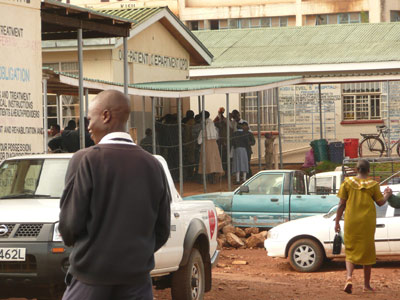Long Term Success Implementing Water Projects Can Be Tricky.
Blue Planet Run Foundation is pleased to share a success story thanks to the Peer Water Exchange. Â
Annette Fay visited Blue Planet Run’s project in Kisii, a crowded town nestled on top of a hilly, green part of the Kenyan countryside. The news from the completed water project demonstrates just how immense the impact of safe drinking water can be on a community. Annette shares her story: Â
I met with the Hospital Superintendent Dr. Otomu, the District Water Engineer Mr. Orangi and the Head Nurse Mrs. Monayo, the latter two walked me through the project. Â
The 200 bed Kisii District Hospital serves 525,000 people directly and is a referral facility for an additional 2,430,000, as far south as the Tanzanian border and west as Lake Victoria’s south-eastern shore. The Kisii area has a high density of HIV/AIDS victims and is known for the prevalence of the deadly highlands malaria after the rainy season. The hospital’s water needs are 180,000 litres per day. Before the water project, if all systems were functioning properly, the hospital had 40,000 litres of water per day from the following sources: 15,000 from a borehole, 10,000 litres from rainwater harvesting and 15,000 litres from the municipal water system. Â
The system installed by the municipality, whose supply is shared with the rest of the community, was put in place 30 years ago when the the population of the area was a fraction of what it is today. Not only does the overtaxed municipal water system usually run dry, but the equipment frequently breaks down and the hospital goes long periods of time with only enough water to use for essential services. Outdoor latrines were used, sheets were not provided for beds, polluted river water was purchased from vendors to use for cleaning, and doctors and nurses had little water to clean their hands after treating patients. People were dying from complications because of the lack of water, patients often had to be referred elsewhere (after traveling long distances on public transportation) because operations couldn’t be performed without sufficient water despite the equipment available; the Hospital was not performing at the level it could because of its water problem. Â
Eight months ago, the Kisii District Hospital Water Project became functional – running water in the hospital! The project has been an incredible success, both for the hospital and the community. Part of the project was to construct water points at the source for the community and a washing bay for women who come to wash their clothes. Because water is stored and directed to the hospital only overnight, the community still uses the source throughout the day; there’s even an emerging market near the washing bay now. The water pump has functioned with no problems and is easily delivering the 180,000 litres of water the hospital needs daily. Visiting the water source, one can easily see why this is where people were collecting water for the hospital and why there are always so many people taking advantage of the water available: despite the capture of 180,000 litres overnight plus the all-day use of the community, there are still multiple streams all around – you even have to cross through a deep puddle to get to the water pump and storage tank! Â
Since the water project was completed eight months ago, the Kisii Hospital has been elevated to a Provincial Hospital. That means it is the referral hospital for the entire Kisii District, whereas before special operations would have been referred to a larger hospital. This is a huge improvement for many patients in the area, who already struggle to get to Kisii from their villages as they won’t have to travel any further. Â
The major roadblocks the project faces at this point are electrification and a piping network. The water pump is currently working on a generator and long-term maintenance will be more effective if it is operating through electricity. Also, water is not supplied to every ward in the hospital, but to the most central wards. In an ideal world, it would be available in every room. Â
Everyone at the Kisii District Hospital was very grateful for water: telling me how the hospital is better, how people aren’t dying like they were before, how happy they are, how it’s allowed the hospital to save up for renovations. Thank you Blue Planet Run! For a full report, please visit www.peerwater.org/projects/61. You can also click on the link back to the Project Application to read more about the initial situation and the dialog during the Review of the project. Â
